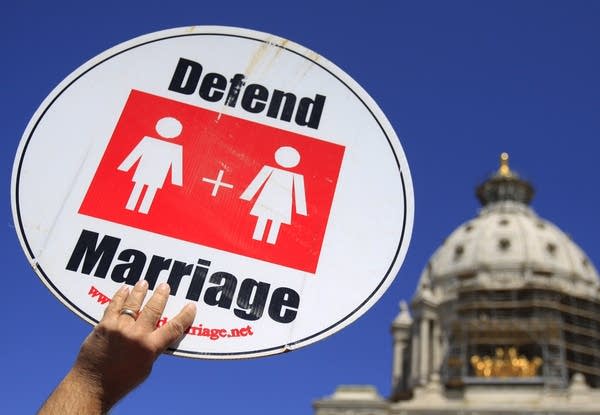Minn. Senate OKs same-sex marriage ban amendment
Go Deeper.
Create an account or log in to save stories.
Like this?
Thanks for liking this story! We have added it to a list of your favorite stories.

A proposed constitutional amendment to ban same-sex marriage in Minnesota is one step closer to being on the ballot next year, after the Minnesota Senate voted Wednesday in favor of the measure, which would ask voters to define marriage in the state Constitution as between one man and one woman.
The Senate passed the proposal 38-27. One Democrat, Sen. Leroy Stumpf of Plummer, joined every Republican to vote for the measure.
Supporters of the amendment, like Sen. Paul Gazelka, R-Brainerd, said voters should settle the debate. State law already defines marriage as between one man and one woman, but Gazelka said it's too important an issue to let state lawmakers or the courts have the final say.
"Certainly the people of Minnesota can and should make the decision," said Gazelka. "The people of Minnesota that I know are, frankly, good natured, warm hearted and full of common sense. And to say that we can't trust them with this kind of decision -- well, I do."
Turn Up Your Support
MPR News helps you turn down the noise and build shared understanding. Turn up your support for this public resource and keep trusted journalism accessible to all.
Sen. Scott Dibble, DFL-Minneapolis, the only openly gay member of the Minnesota Senate, said he was shocked that his colleagues passed the amendment.
"It's a sad and shameful day, and those who voted for this are going to be ashamed of themselves," said Dibble. "We're taking this to the streets, and we're going to the ballot in 2012. Thirty-one states have passed this thing. It's not going to be 32."
Listen to an eight-minute audio clip of the Senate debate and a one-on-one debate between House bill author Rep. Steve Gottwalt and opponent Rep. Steve Simon.
Marriage amendments have been successful at the polls in other states. Arizona is the only state where voters defeated an amendment to ban same-sex marriage, and any legal equivalent. But they later approved the amendment after the wording was changed to remove the words "any legal equivalent." Minnesota's proposal would not ban such legal equivalents like civil unions.
Dibble and other Democrats argue that the ballot initiative will spark an ugly, vile and slanderous campaign against gay Minnesotans.

Sen. Ron Latz, DFL-St. Louis Park, said Republicans are making a political calculation that the same-sex marriage amendment and other constitutional amendments will drive GOP voters to the polls in a key presidential election next year.
"There are issues that the Republicans believe will work to their political advantage," said Latz, "in that they will be able to not only trumpet our votes here on the Senate floor ... but will be able to use those positions to shape the voter turnout and shape the votes in the general election."
Latz and other Democrats allege that Republicans are looking to boost voter turnout in 2012 because Democratic voters are more likely to turn out in a presidential election. No Republican has yet announced a challenge to well-financed and popular Democratic U.S. Sen. Amy Klobuchar, who is up for re-election next year.
Republicans deny that claim. They say they want to let voters decide important issues like banning same-sex marriage and requiring people to show a photo ID to vote.
"It's a sad and shameful day, and those who voted for this are going to be ashamed of themselves."
Sen. Warren Limmer, R-Maple Grove, the author of the marriage amendment, says the experiences of other states shows little evidence the marriage amendment would have any impact on other races on the 2012 ballot.
"I don't think it holds water when you look at other states -- mainly California in the last presidential election," said Limmer. "That, too, had a marriage amendment being asked for the public to decide, and yet in the very same election, President Obama was elected from California."
DFL Gov. Mark Dayton also believes Republicans are looking to use constitutional amendments to boost GOP voter turnout. Dayton told MPR News that those measures may backfire, because younger voters may make a point to show up at the polls in 2012.
"They may find that it works the other way around, that more people will come out in opposition to those measures than in support of them," Dayton said. "That's often what happens with the law of unintended consequences, which is one of the guiding principles that I've come to learn in the political realm."
Dayton has no say over whether the amendment will end up on the ballot. Unlike other bills, the governor has no veto power over constitutional amendments once they're passed by a majority of the Legislature.
MAP: HOW THEY VOTED
See more on the MPR Votetracker.
Dear reader,
Political debates with family or friends can get heated. But what if there was a way to handle them better?
You can learn how to have civil political conversations with our new e-book!
Download our free e-book, Talking Sense: Have Hard Political Conversations, Better, and learn how to talk without the tension.




